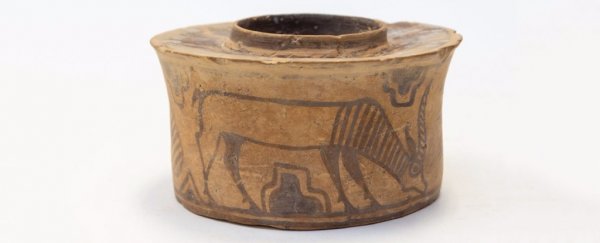When Karl Martin of Derbyshire, England picked up a pair of pots for £4 (US$5) at a car boot sale, all he wanted was a nice jar to put his toothbrush in. And for five years, that's precisely what he had.
Imagine his surprise when that toothbrush jar, decorated with a painted antelope, turned out to be an ancient artefact of the Indus Valley Harappan Civilisation, dating back to around 4,000 years ago.
"I used it in the bathroom to store my toothpaste and toothbrush - it even ended up getting a few toothpaste marks on it," Martin said in a statement.
As Antiques Roadshow participants (and viewers) well know, that old-looking doodad you picked up at a yard sale is very unlikely to be valuable or interesting, so Martin - who, ironically, works for Hansons Auctioneers and regularly handles artefacts - didn't really think too much about it.
"I suspected it might be very old but forgot all about it," he said.
"Then, one day at work, I was helping Hansons' antiquities expert James Brenchley unload a van and noticed some pottery which was similar to my toothbrush pot. The painting style looked the same and it had similar crudely-painted animal figures."
He took it to Brenchley for appraisal, who identified it as, yep, that's an Indus Valley pot all right. Specifically, it hails from what is now Afghanistan, at around 1900 BCE.
In the Bronze Age, the Indus Valley was one of the three early cradles of civilisation, alongside Egypt and Mesopotamia, and it was spread across what is now India and Pakistan, with some locations in Afghanistan.
Because the civilisation was so widespread, and because many of the ruins have been well preserved across the millennia, historians and archaeologists have studied it extensively. This is how Brenchley was able to confirm the pot's provenance.
As to how it got to be in a car boot sale in Derbyshire, that's a little more mysterious. Brenchley believes wealthy travellers must have picked it up and brought it back to England many years ago, but unless they pop up with an explanation, we're unlikely to find out.
Martin ended up selling the pot at a Hansons auction on November 26. It fetched £80 (US$101.77), which isn't exactly priceless, but not bad for something that only cost a few pounds.
"Perhaps I should have held on to it," Martin concluded. "I feel a bit guilty about keeping my toothbrush in it now."
